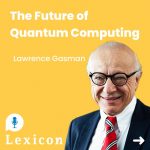Quantum News Briefs July 3: Rensselaer Polytechnic Institute plans to deploy first IBM Quantum System One on a university campus, IonQ signs agreement with South Korea’s Ministry of Science & ICT to cultivate regional quantum computing ecosystem, A major quantum computing leap with a magnetic twist – “A New Paradigm + MORE

Quantum News Briefs July 3: Rensselaer Polytechnic Institute plans to deploy first IBM Quantum System One on a university campus, IonQ signs agreement with South Korea’s Ministry of Science & ICT to cultivate regional quantum computing ecosystem, A major quantum computing leap with a magnetic twist – “A New Paradigm + MORE
Rensselaer Polytechnic Institute plans to deploy first IBM Quantum System One on a university campus
 It was announced June 28 that Rensselaer Polytechnic Institute will become the first university in the world to house an IBM (NYSE: IBM) Quantum System One. The IBM quantum computer, intended to be operational by January of 2024, will serve as the foundation of a new IBM Quantum Computational Center in partnership with Rensselaer Polytechnic Institute (RPI). Quantum News Briefs summarizes.
It was announced June 28 that Rensselaer Polytechnic Institute will become the first university in the world to house an IBM (NYSE: IBM) Quantum System One. The IBM quantum computer, intended to be operational by January of 2024, will serve as the foundation of a new IBM Quantum Computational Center in partnership with Rensselaer Polytechnic Institute (RPI). Quantum News Briefs summarizes.
By partnering, RPI’s vision is to greatly enhance the educational experiences and research capabilities of students and researchers at RPI and other institutions, propel the Capital Region into a top location for talent, and accelerate New York’s growth as a technology epicenter.
RPI’s advance into research of applications for quantum computing will represent a more than $150 million investment once fully realized, aided by philanthropic support from Curtis R. Priem ’82, vice chair of RPI’s Board of Trustees. The new quantum computer will be part of RPI’s new Curtis Priem Quantum Constellation, a faculty endowed center for collaborative research, which will prioritize the hiring of additional faculty leaders who will leverage the quantum computing system.
“We are grateful for Curtis Priem’s support. RPI is building upon our longstanding collaboration with IBM to harness state-of-the-art computing to find solutions to global challenges, while training the next-gen workforce in quantum,” said Marty A. Schmidt ’81, Ph.D., President of RPI. . . “We look forward to working with our partners in the region to transform the Hudson River Valley into ‘Quantum Valley.'”
“The Capital Region is a major center of global semiconductor R&D and manufacturing and key to other emerging industries like quantum computing,” said U.S. Senator Charles Schumer. “The region is home to one of the most advanced R&D facilities at the Albany Nanotech Complex, where cutting-edge research is happening like IBM’s development of the world’s smallest semiconductor chip. The region is also home to premier research institutions like RPI, and under the leadership of President Marty Schmidt, RPI is continuing its 200-year legacy as one of the top technological universities. What a great new feather for the region’s cap to have the first IBM Quantum System One placed on a university campus! This sets the Capital Region and Upstate New York apart and will be an asset to recruit and retain talent locally, and help train students in high-value careers.”
Founded in 1824, Rensselaer encompasses five schools, over 30 research centers, more than 145 academic programs including 25 new programs, and a dynamic community made up of over 6,800 students and 110,000 living alumni. Rensselaer faculty and alumni include upward of 155 National Academy members, six members of the National Inventors Hall of Fame, six National Medal of Technology winners, five National Medal of Science winners, and a Nobel Prize winner in Physics. With nearly 200 years of experience advancing scientific and technological knowledge. See. www.rpi.edu
IBM’s breakthrough innovations in AI, quantum computing, industry-specific cloud solutions and consulting deliver open and flexible options to all clients. All of this is backed by IBM’s legendary commitment to trust, transparency, responsibility, inclusivity and service. Click here to read announcement in-entirety.
IonQ signs agreement with South Korea’s Ministry of Science and ICT to cultivate regional quantum computing ecosystem
 IonQ has signed a Memorandum of Understanding (MOU) with South Korea’s Ministry of Science and ICT (Information and Communications Technology) to educate quantum science and technology professionals and promote the creation of a local quantum ecosystem. Quantum News Briefs summarizes.
IonQ has signed a Memorandum of Understanding (MOU) with South Korea’s Ministry of Science and ICT (Information and Communications Technology) to educate quantum science and technology professionals and promote the creation of a local quantum ecosystem. Quantum News Briefs summarizes.
The MOU reflects the two parties’ agreement to mutually cooperate in supporting South Korea’s vibrant and growing quantum computing industry.
The MOU aims to harness IonQ’s resources and experience to operate an education, training, and leadership expansion program to support masters and doctorate students, postdoctoral researchers, and quantum industry professionals in South Korea.The MOU was signed on June 27th at Quantum Korea 2023, hosted by South Korea’s Ministry of Science and ICT in Seoul. Leading global quantum innovators gathered at the event, where IonQ exhibited its quantum technology and achievements, its highest performing quantum computer, and recent achievements demonstrating applications in quantum machine learning.
“To promote the growth of their local quantum computing ecosystems, national and regional governments need to engage with industry partners who have deep understandings of the field,” said Kim. “Through this agreement with the Ministry of Science and ICT, we are honored to take part in developing quantum science and technology professionals and preparing South Korea’s quantum industry infrastructure. We hope we can contribute to the country’s vision of becoming a global quantum-centered economy by 2030 by providing practical support, such as an education, training, and leadership expansion program utilizing IonQ’s specialized quantum computing resources and experience.” Click here to read entire announcement.
A major quantum computing leap with a magnetic twist – “A New Paradigm”
A University of Washington-led team has made a key quantum computing breakthrough by detecting fractional quantum anomalous Hall states in semiconductor material flakes, which could be instrumental in creating stable, fault-tolerant qubits.
Yet the qubit platforms unveiled to date have a common problem: They tend to be delicate and vulnerable to outside disturbances. A photon is a particle of light. It is the basic unit of light and other electromagnetic radiation, and is responsible for the electromagnetic force, one of the four fundamental forces of nature.
A team led by scientists and engineers at the University of Washington has announced a significant advancement in this quest. In a pair of papers published on June 14 in Nature and June 22 in Science, they report that, in experiments with flakes of semiconductor materials — each only a single layer of atoms thick — they detected signatures of “fractional quantum anomalous Hall” (FQAH) states. The team’s discoveries mark a first and promising step in constructing a type of fault-tolerant qubit because FQAH states can host anyons — strange “quasiparticles” that have only a fraction of an electron’s charge. Some types of anyons can be used to make what are called “topologically protected” qubits, which are stable against any small, local disturbances.
“This really establishes a new paradigm for studying quantum physics with fractional excitations in the future,” said Xiaodong Xu, the lead researcher behind these discoveries, who is also the Boeing Distinguished Professor of Physics and a professor of materials science and engineering at the UW
DIGITAL and NGen partner to launch $30M in new quantum projects
 NGen, the industry-led organization leading Canada’s Global Innovation Cluster for Advanced Manufacturing and DIGITAL, Canada’s Global Innovation Cluster for digital technologies, have partnered to launch $30 million in new projects to drive the commercialization of quantum technologies. Quantum News Briefs summarizes the announcement.
NGen, the industry-led organization leading Canada’s Global Innovation Cluster for Advanced Manufacturing and DIGITAL, Canada’s Global Innovation Cluster for digital technologies, have partnered to launch $30 million in new projects to drive the commercialization of quantum technologies. Quantum News Briefs summarizes the announcement.
The clusters will build on Canada’s National Quantum Strategy to deliver industry-led commercialization projects that use quantum technologies to solve industrial and societal challenges. The clusters will leverage their cross-country networks to deploy Canada’s world-leading R&D leadership to deliver strategic industrial advantages through the use of emerging quantum technologies.
Under the National Quantum Strategy, DIGITAL and NGen will receive $14 million in total to advance the commercialization of products, services and technologies based on advances in quantum science. The clusters aim to leverage the NQS funding to attract more than $30 million in total investments and will focus their projects in three key categories of quantum technologies including:
- Quantum Sensors – photonics and transducers, chip-based quantum systems.
- Quantum Networks – quantum communications, quantum key distribution, quantum internet.
- Quantum Computing – quantum software, cryptography, algorithms, information processing, hybrid applications, hardware, and middleware.
In the coming weeks the clusters will provide more information about the mechanics of the program including priority sectors for applications, a formal call for proposals, timelines for applications and eligibility criteria for projects.
DIGITAL and NGen invite individuals and organizations who would like to receive updates or learn more about the opportunity to sign up for notifications by completing the form at quantumadvantage.ngen.ca.
Click here to read NGEN announcement in-entirety.
Sandra K. Helsel, Ph.D. has been researching and reporting on frontier technologies since 1990. She has her Ph.D. from the University of Arizona.























